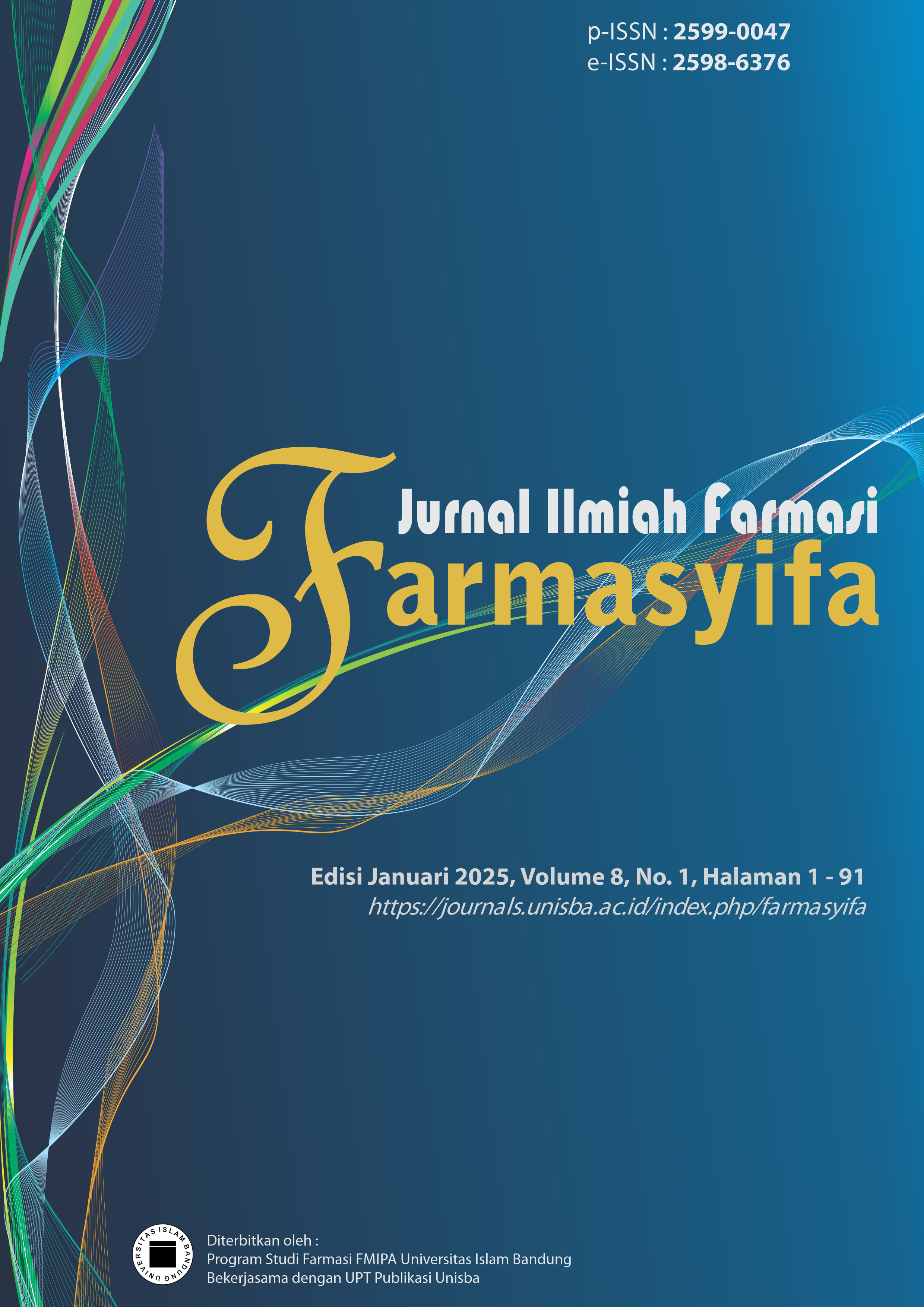The Relationship Between Knowledge Level and Attitudes and Perceptions of Doctors and Pharmacists Regarding the Halalness of Drugs at RST Magelang
HUBUNGAN TINGKAT PENGETAHUAN DENGAN SIKAP DAN PERSEPSI DOKTER DAN TENAGA KEFARMASIAN MENGENAI KEHALALAN OBAT DI RST MAGELANG
DOI:
https://doi.org/10.29313/jiff.v8i1.2961Keywords:
Halal Medicine, Attitude, Knowledge Level, Doctor, PharmacistAbstract
When it comes to countries having a predominantly Muslim population, Indonesia tops the list. In order to raise Muslim shoppers' awareness about the need of buying halal goods. The State of the Global Islamic Economy study confirms that in 2018, the Muslim community spent USD 2.2 trillion on halal food and pharmaceuticals in accordance with Islamic norms. since such, knowing whether or not a product is halal is essential, since it might have repercussions for one's health and spiritual well-being. The presence of halal labels in pharmacies is one clue. Doctors and other medical professionals, as well as pharmacists and pharmacy technicians, play a crucial role in helping patients decide which medications will work best for them. One of the aspects that might affect attitudes and views about choosing halal pharmaceutical goods is the amount of information. The purpose of this research is to ascertain the degree to which medical professionals and pharmacists at RST Magelang have a common understanding of the halal status of certain pharmaceuticals. A questionnaire was used to gather data for the study's cross-sectional design. Sixty medical professionals from RST Magelang were utilized as samples. Total sampling was used to get a representative sample of the population that fulfilled the study's inclusion criteria. The Spearman Rank statistical test is used to analyze the data. The correlation between education and attitude was found to have a P value of 0.972 (> 0.05), whereas that between education and perception had a value of 0.396 (> 0.05). The research found no statistically significant correlation between medical professionals' and pharmacists' awareness of the halal status of medications sold at RST Magelang.
References
Alfian, I. (2017). Analisis Pengaruh Label Halal, Brand Dan Harga Terhadap Keputusan Pembelian Di Kota Medan, 24.
Amin, M. A. (2017). Klasifikasi Kelompok Umur Manusia Berdasarkan Analisis Dimensi Fraktal Box Counting Dari Citra Wajah Dengan Deteksi Tepi Canny. 2, 10.
Arikunto, S. (2016). Prosedur Penelitian Suatu Pendekatan Praktik. Jakarta.
Aswirna, P. and Fahmi, R. (2018). Peningkatan Pemahaman Masyarakat Tentang Pentingnya Mengonsumsi Produk Halal. Universitas Islam Imam Bonjol.
En, S. (2020). Pengaruh Religiusitas Dan Brand Image Terhadap Behavioral Intention Dengan Trust Dan Satisfaction Sebagai Variabel Mediasi Pada restoran Halal. 6.
Badan Pusat Statistik, B. (2020). Data Statistik Indonesia, Jumlah Penduduk Islam Di Indonesia Tahun 2020, Jakarta : Badan Pusat Statistik.
Edris, M. (2020). Analisis Perilaku Pembelian Obat-Obatan Halal Di Provinsi Jawa Tengah. Journal of Management and Businees Review, 17, 155–165. https://doi.org/10.34149/jmbr.v17i2.181
Erniza Pratiwi, Fina Aryani, Yulia Indri Yani, & R. S. D. (2019). Analisis Faktor-Faktor Yang Mempengaruhi Pilihan Karir Mahasiswa Farmasi Di Sekolah Tinggi Ilmu Farmasi Riau.
Indonesia Lifestyle Center, M. (2018). Memacu Revolusi Ekonomi Islam 4.0. 42, 1(1), 1–40.
Larasati, A., Hati, S. R. H., & Safira, A. (2018). No Title. Religiusitas Dan Pengetahuan Terhadap Sikap Dan Intensi Konsumen Muslim Untuk Membeli Produk Kosmetik Halal. Esensi : Jurnal Bisnis Dan Managemen, 8(2), 105–114. https://doi.org/10/15408/ess.v8i2.7459
Legowati. D. A., & UI Albab, F. N. (2020). Pengaruh Attitude, Sertifikasi Halal, Promosi Dan Brand Terhadap Purchase Intention Di Restoran Bersetifikasi Halal. Ihtifaz: Journal of Islamic Economics, Finance, and Banking, 39. https://doi.org/10.12928/ijiefb.v2i1.787
Lestari, A., Pratikto, D. H. H., & Hermawan, D. A. (2020). The Effect Of Religiusity On The Purchase Intention Halal Cosmetics Through Attitude (Studies On Muslim At Several Universitas In Malang, Indonesia), 22 (1)(9).
Notoarmodjo, S. (2012). Promosi Kesehatan Dan Perilaku Kesehatan. Jakarta: PT. Rineka Cipta.
Notoatmodjo, S. (2018). Metodologi Penelitian Kesehatan. Cetakan Ke 3. Jakarya: PT. Rineka Cipta.
Octavia, M. (2022). Hubungan Tingkat Pengetahuan dan Perilaku Mengenai Produk Farmasi Halal pada Apoteker di Apotek Yogyakarta. Medical Sains : Jurnal Ilmiah Kefarmasian, 7(3), 667–682.
Prastiwi, Y. N. (2018). Pengaruh Label Halal Dan Citra Merek Terhadap Perilaku Pembelian Kosmetik Sariayu Dengan Religiusitas Sebagai Variabel Moderating. Universitas Islam Indonesia.
Riduwan. (2013). Skala Pengukuran Variabel-Variabel Penilitian Bandung: Alfabeta.
Riyanto, A. (2011). Aplikasi Metodologi Penelitian Kesehatan. Yogyakarta: Nuha Medika.
Septiani, D. D., Salwati, T., & Rahmawati, A. (2013). Hubungan Pengetahuan Tentang Posyandu Dengan Partisipasi Kader Dalam Kegiatan Posyandu Purnama Di Walayah Puskesmas Ringinarum Kabupaten Kendal, 8.
Septiani. D., & Ridlwan, A. A. (2020). The Effect of Halal Certification and Halal Awareness of Purchase Intention of Halal Food Products in Indonesia. Indonesian Journal of Halal Research (IJHAR), 2(2), 55–60. https://doi.org/10.15575/ijhar.v2i2.6657
Supraptiningnsih, S. (2017). “Kualitas Pelayanan Kepuasan Pasien Rumah Sakit: Kasus Pada Pasien Rawat Jalan.” Jurnal Medicotilegal Dan Manajemen Rumah Sakit, 9–15.
Trisnawati, A.-. (2017). Tingkat Pengetahuan, Sikap, dan Persepsi Tenaga Kesahatan terhadap Kehalalan Obat di Rumah Sakit Kabupaten Banyumas. Jurnal Ilmiah Farmasi Farmasyifa, 1(1), 1–12. https://doi.org/10.29313/jiff.v1i1.2873
Yuswantina, S. (2019). Pengaruh Brand Image Dan Label Halal Terhadap Keputusan Pembelian Kosmetik (Survei Pada Pengguna Kosmetik Dikota Jambi). Universitas Islam Negeri Sultan Thaha Saifuddin.
Downloads
Published
How to Cite
Issue
Section
License
Copyright (c) 2025 Chilmia Nurul Fatiha, Anggraini Dwi Ayu Fitria, Fabianus Herman Kurniawan

This work is licensed under a Creative Commons Attribution-ShareAlike 4.0 International License.






















